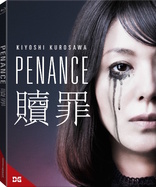Penance Blu-ray Movie
HomePenance Blu-ray Movie 
贖罪 / ShokuzaiMusic Box Films | 2012 | 300 min | Not rated | Nov 18, 2014
Movie rating
6.8 | / 10 |
Blu-ray rating
| Users | 0.0 | |
| Reviewer | 3.5 | |
| Overall | 3.5 |
Overview
Penance (2012)
A murder of a young child. The mother that gives life long penance to the four girlfriends that have witness whose the murderer, but in fear and shock can't remember the face of murderer. 15 years later it isn,t the spoken curse of the mother, but the self- created walk of life of the now 4 adult witnesses and their road to despair are shown in five parts.
Starring: Kyôko Koizumi, Yu Aoi, Eiko Koike, Sakura Andô, Miki HayashidaDirector: Kiyoshi Kurosawa
| Foreign | Uncertain |
| Psychological thriller | Uncertain |
| Drama | Uncertain |
| Thriller | Uncertain |
| Crime | Uncertain |
| Mystery | Uncertain |
Specifications
Video
Video codec: MPEG-4 AVC
Video resolution: 1080i
Aspect ratio: 1.78:1
Original aspect ratio: 1.78:1
Audio
Japanese: DTS-HD Master Audio 2.0
Subtitles
English
Discs
50GB Blu-ray Disc
Two-disc set (2 BDs)
Playback
Region A (locked)
Review
Rating summary
| Movie | 3.5 | |
| Video | 4.0 | |
| Audio | 4.0 | |
| Extras | 1.5 | |
| Overall | 3.5 |
Penance Blu-ray Movie Review
Crime and punishments.
Reviewed by Jeffrey Kauffman November 28, 2014To an outsider, Japanese culture can often seem incredibly ordered, even regimented, with a homogeneity of behavior that would seem to suggest social unrest and perhaps even crime are not worrisome items on the agenda anymore. Writer-director Kiyoshi Kurosawa plays with that perceived calm by presenting long, static takes in Penance where only incremental changes take place—at least for a little while, until something devastating like a child’s brutal murder suddenly wafts into the frame. Penance, based on a bestselling book called Shokuzai by Kanae Minato, which became something akin to the Japanese equivalent of The Dragon Tattoo Trilogy, was adapted into a five hour or so miniseries by Kurosawa which aired on Japan’s Wowow network. Slightly reworked into a putative feature film form (which screened theatrically in a limited release), Penance is, like Dragon Tattoo itself, an episodic account of a long ago murder and its subsequent effects on a coterie of characters. Kurosawa structures the first four of the five episodes around one of the witnesses to the crime—and there were indeed witnesses. Interestingly, Kurosawa shows the viewer the killer, at least in profile, so there’s not much mystery in one sense, though who exactly the culprit is and why he kills a sweet little schoolgirl name Emili is left unanswered until the fifth episode, which deals mostly with Emili’s distraught mother Asako (Kyoko Koizumi), who in unable to cope not just with her daughter’s murder, but the fact that four of Emili’s little playmates refuse (for reasons which are never made entirely clear) to identify the killer. Asako calls the girls together a few months after Emili’s murder, at Emili’s putative “birthday” party, to inform the kids that unless they help identify the murderer, Asako will extract “penance” from each of them, on her own seemingly unhinged terms. Flash forward fifteen or so years, and each of these witnesses to horror have entered into adulthood with various amounts of emotional baggage and coping mechanisms.

Kurosawa has sown his reputation as a horror auteur, though often by not utilizing traditional genre tropes. In a series of sometimes patently odd films like Doppelganger, Tokyo Sonata and Real, Kurosawa has emphasized almost picayune detail and sometimes rather small scale character beats in lieu of outright gore or overt shocks. Kurosawa employs a rather languid camera style that is at times reminiscent of Stanley Kubrick, where “action” within the frame often approaches still life levels. That same placid quality is often also at least evident on the surface of some of Kurosawa’s characters, even if their psyches are often roiling pits of dysfunction and trauma.
That approach gives Penance its weird, almost dreamlike, quality, where Kurosawa devotes a quintet of episodes into explorations of the after effects of little Emili’s murder on her mother and the four other little girls who were with the victim on the day of her demise. As a mystery, Penance is interesting if never really viscerally compelling, and in fact it’s at least arguable that the final episode, where Kurosawa lays out a long simmering history between various characters which resulted in the slaying, is the least effective of the bunch. What tends to work better here is the odd, at times almost hallucinatory, character studies.
Each of the four girls enters adulthood with odd behavior tics, which rather characteristically Kurosawa plays with in both dramatic and comedic fashion. Sae (Yu Aoi) has literally “refused” to become a woman, insisting to a prospective boyfriend that she’s never had a period. Maki (Eiko Koike) has deep seated anger issues which play out, initially somewhat heroically, when she confronts a madman at a school where she teaches. Akiko (Sakura Ando) may have gone a step further and suffered a psychotic (or at least a neurotic) break, walking a borderline between reality and fantasy. Yuka (Chizuru Murakami) seems on the face of things to be the best adjusted to things, but as her episode plays out, her bravado seems somewhat more perilous. Asako floats in and out of each episode at key moments, usually clad in black, as if a harbinger of ill intent.
While Penance is undeniably moody and evocative, ultimately it may strike some—especially at this extended length—as, if not much ado about nothing, much ado about not very much. In fact the very banality of the underlying cause of Emili’s murder seems to undercut the very portentousness with which Kurosawa attempts to infuse the project. The whole “penance” angle itself is awfully discursive at any rate, since each of the four erstwhile witnesses obviously don’t need much help from Asako to make their lives hellish.
Still, the Grimm’s Fairy Tale ambience of Penance is at times quite palpable, especially in sequences where Kurosawa exploits a quiet but nuanced directorial virtuosity. Even a simple scene which has a character reacting in distress is given additional weight by Kurosawa’s choices in framing and a counterintuitive dolly away from the character. Penance provides a field day for the five focal females, with Koizumi, a Kurosawa stalwart, unforgettable as the alternately steely and fragile Asako. As a television “event”, Penance may be too cerebral for its own good, something that tends to also afflict its status as a rather lengthy “feature film.” But there’s an undeniably subliminal reach to this piece that ultimately speaks to the heart, even if it never ends up actually touching it.
Penance Blu-ray Movie, Video Quality 
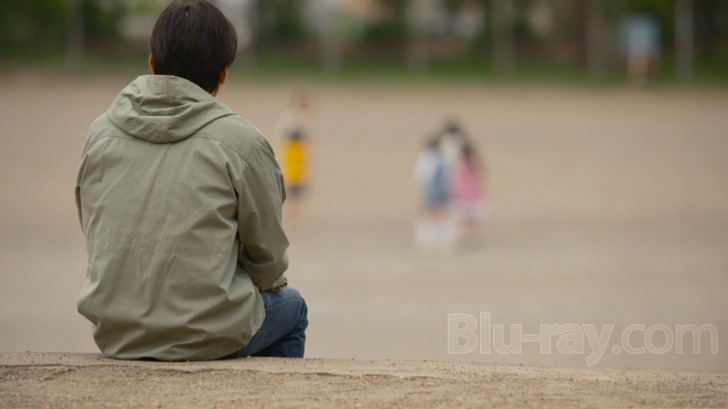
Penance is presented on Blu-ray courtesy of Music Box Films and Doppelganger Releasing with an AVC encoded 1080i transfer in 1.78:1. Reportedly shot with the old school HDCAM, Penance has a somewhat shallow and flat appearance in high definition, something that is perhaps exacerbated by the desaturated look that Kurosawa prefers for the bulk of the film. In fact, it's only in the relatively rosier flashbacks to Emili’s childhood where anything approaching "pop" shows up in the palette, courtesy of elements like the little girl's bright red herringbone patterned dress. Much of Penance plays out in almost black and white, with Asako's darker outfits contrasting against a largely monochromatic background. Whites occasionally tend to bloom slightly, and minimal banding is in evidence at times as well. There are one or two instances of noise, perhaps surprisingly not in overly dark scenes. Detail is still very strong throughout the bulk of this presentation, with some close-ups offering excellent fine detail (see screenshot 5).
Penance Blu-ray Movie, Audio Quality 
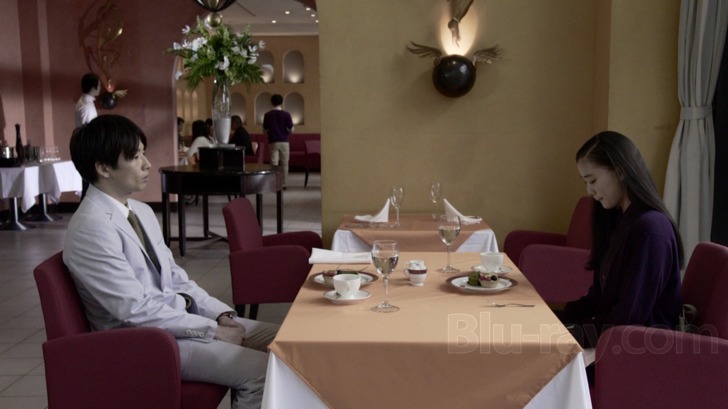
Penance features lossless DTS-HD Master Audio 2.0 audio in the original Japanese (optional English subtitles are included). The sound mix here is not especially remarkable, since the bulk of the film tends to play out in rather quiet, almost hushed, dialogue scenes, typically between two characters. The doesn't offer much in the way of even excessive stereo separation. Nonetheless, fidelity is excellent and Yusuke Hayashi's varied score, which traffics in everything from quasi-Herrmann cues to bagpipe music, sounds great.
Penance Blu-ray Movie, Special Features and Extras 
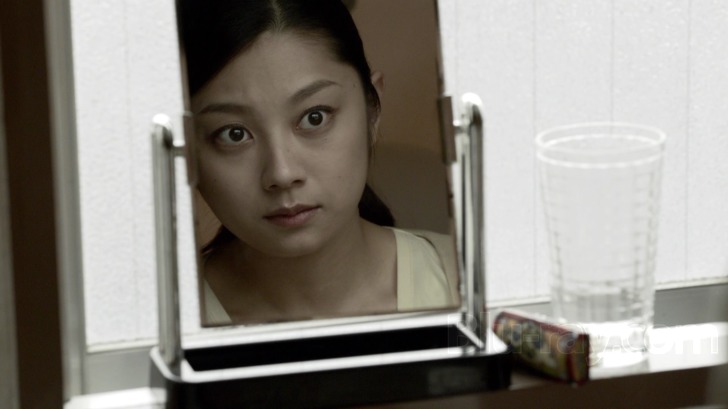
- Interviews (1080i; 23:35) include Kiyoshi Kurosawa, Kyoko Koizumi, Teruyuki Kagawa, Yu Aoi, Eiko Koike, Sakura Ando and Chizuru Ikewaki.
- Trailer (1080i; 1:34)
Penance Blu-ray Movie, Overall Score and Recommendation 
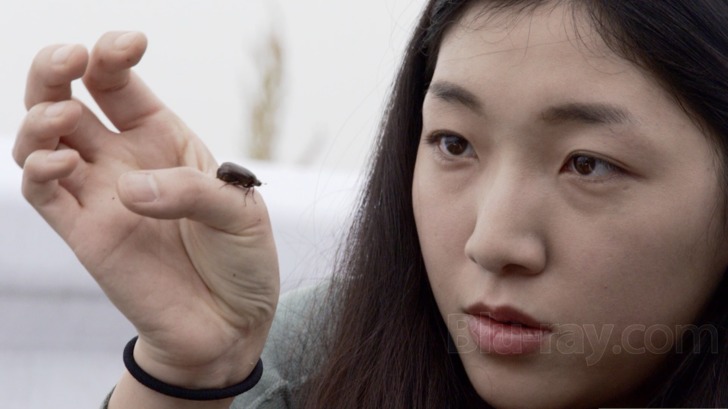
Penance is probably an example of a whole not being quite equal to the sum of its parts, but this putative miniseries' spell is quite notable, even if the underlying "mystery" turns out to be surprisingly drab and tawdry. Kurosawa is a rather quiet, unassuming provocateur, and his sly directorial misdirection is one of Penance's most arresting achievements. As weirdly surreal in its own way as another famous "murder mystery," Twin Peaks: The Entire Mystery, Penance also shares a certain Lynchian quality of asking more intriguing questions than it is able to sufficiently answer. Probably best "enjoyed" (if that's the right word, considering the dour subject matter) as a fascinating experiment in relatively long form television, Penance provides several standout moments in what is ultimately a curiously commonplace tale. Technical merits are generally very good, and Penance comes Recommended.
Similar titles
Similar titles you might also like

Demonlover
2002

Mother
마더 / Madeo
2009

High and Low 4K
天国と地獄 / Tengoku to jigoku
1963

Killers
2014

The Lady in the Car with Glasses and a Gun
2015

Confessions
2010

Nightcap
Merci pour le Chocolat
2000

Insomnia
1997

Rashomon
羅生門 / Rashômon
1950

Le Corbeau
The Raven
1943

Everybody Knows
Todos lo saben
2018

The Champagne Murders
Le scandale
1967

I... For Icarus
I... comme Icare
1979

Rider on the Rain
Le passager de la pluie
1970

Tell No One
Ne le dis à personne
2006

Beasts Clawing at Straws
2020

Yokohama BJ Blues
ヨコハマBJブルース | Yokohama BJ burûsu | Limited Edition
1981

Dr. Mabuse: The Gambler
Dr. Mabuse, der Spieler - Ein Bild der Zeit
1922

Memories of Murder
살인의 추억 / Salinui chueok
2003

The American Friend
Der amerikanische Freund
1977
